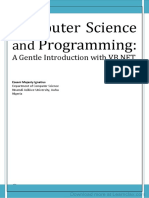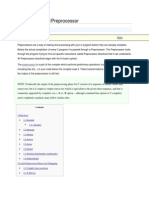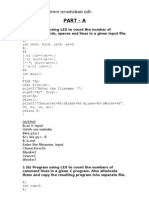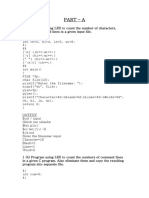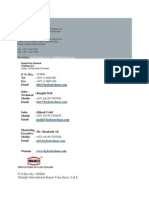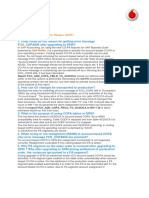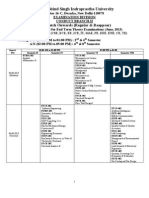TutorialFlexBison PDF
Uploaded by
Anoop ChauhanTutorialFlexBison PDF
Uploaded by
Anoop ChauhanFlex and Bison Tutorial Note: for more complex flex input file, you might get an error
flex input file, you might get an error message like
Ming-Hwa Wang, Ph.D "parse tree too big, try %a num (or %e num)"
COEN 259 Compilers Then you need to define %e <num>. You should put it between macro and
Department of Computer Engineering %start symbol. The other options are %a, %o, %n, %p, etc.
Santa Clara University
Bison
Flex Bison is a LALR(1) parser generator tool for syntax analysis, which is based
Flex is a scanner generator tool for lexical analysis, which is based on finite on pushdown automata (PDA). The input is a set of context-free grammar
state machine (FSM). The input is a set of regular expressions, and the (CFG) rules, and the output is the code to implement the parser according to
output is the code to implement the scanner according to the input rules. the input rules.
To implement a scanner for calculator, we can write the file “cal1.l” as To implement a parser for calculator, we can write the file “cal.y” as below:
below:
%{
/* this is only for scanner, not link with parser yet */ #include <stdio.h>
%{ #include <ctype.h>
int lineNum = 0; int lineNum = 1;
%} void yyerror(char *ps, ...) { /* need this to avoid
link problem */
%% printf("%s\n", ps);
}
"(" { printf("(\n"); } %}
")" { printf(")\n"); }
"+" { printf("+\n"); } %union {
"*" { printf("*\n"); } int d;
\n { lineNum++; } }
[ \t]+ { } // need to choose token type from union above
[0-9]+ { printf("%s\n", yytext); } %token <d> NUMBER
%token '(' ')'
%% %left '+'
%left '*'
int yywrap() { %type <d> exp factor term
return 1;
} %start cal
int main () { %%
yylex();
return 0; cal
} : exp
{ printf("The result is %d\n", $1); }
Here is the Makefile used to build the scanner: ;
p1: lex.yy.o exp
gcc -g -o p1 lex.yy.o : exp '+' factor
{ $$ = $1 + $3; }
lex.yy.o: cal1.l | factor
flex cal1.l; gcc -g -c lex.yy.c { $$ = $1; }
;
clean:
rm -f p1 *.o lex.yy.c factor
: factor '*' term #ifdef DEBUG
{ $$ = $1 * $3; } printf("token '+' at line %d\n", lineNum);
| term #endif
{ $$ = $1; } return '+';
; }
"*" {
term #ifdef DEBUG
: NUMBER printf("token '*' at line %d\n", lineNum);
{ $$ = $1; } #endif
| '(' exp ')' return '*';
{ $$ = $2; } }
; [0-9]+ {
#ifdef DEBUG
%% printf("token %s at line %d\n", yytext, lineNum);
#endif
int main() { yylval.d = atoi(yytext);
yyparse(); return NUMBER;
return 0; }
}
%%
To integrate both the scanner and parser, we need to modify the scanner
input file “cal1.l” and save it as “cal.l” as below: int yywrap() { /* need this to avoid link problem */
return 1;
%{ }
#include <stdlib.h> /* for atoi call */
#define DEBUG /* for debuging: print tokens and Here is the Makefile used to build the scanner and parser:
their line numbers */
#define NUMBER 258 /* copy this from cal.tab.c */ p2: lex.yy.o cal.tab.o
typedef union { /* copy this from cal.tab.c */ gcc -o p2 lex.yy.o cal.tab.o
int d;
} YYSTYPE; lex.yy.o: cal.l
YYSTYPE yylval; /* for passing value to parser */ flex cal.l; gcc -c lex.yy.c
extern int lineNum; /* line number from cal.tab.c */
%} cal.tab.o: cal.y
bison -d cal.y; gcc -c cal.tab.c
%%
clean:
[ \t]+ {} rm -f p2 cal.output *.o cal.tab.c lex.yy.c
[\n] { lineNum++; }
"(" { There are some tips to debug Bison.
#ifdef DEBUG 1. Run Bison with –v option, then a file cal.output is generated. It contains
printf("token '(' at line %d\n", lineNum); all the conflicts and/or never reduced rules, and all the states generated
#endif by Bison.
return '(';
2. To get debug information from Bison: first, add -DYYDEBUG when
}
compiling cal.tab.c; second, set the environment variable YYDEBUG=1.
")" {
#ifdef DEBUG Then it will print a bunch of debug information, e.g. how to shift or
printf("token ')' at line %d\n", lineNum); reduce.
#endif
return ')';
}
"+" {
You might also like
- A Common Person'S Wordperfect Macro Manual: Additional ResourcesNo ratings yetA Common Person'S Wordperfect Macro Manual: Additional Resources8 pages
- The Genius Chronicles: Going Boldly Where None Have Gone Before?No ratings yetThe Genius Chronicles: Going Boldly Where None Have Gone Before?64 pages
- Picturing Programs An Introduction To Computer ProgrammingNo ratings yetPicturing Programs An Introduction To Computer Programming474 pages
- Windows Scripting Host Programmer's ReferenceProgrammer's Reference100% (1)Windows Scripting Host Programmer's ReferenceProgrammer's Reference44 pages
- Chapter 1: Fortran Programming: Detailed NotesNo ratings yetChapter 1: Fortran Programming: Detailed Notes19 pages
- Geeksforgeeks Org Variadic Functions in CNo ratings yetGeeksforgeeks Org Variadic Functions in C1 page
- CSC101 Computer Science and Programming Ezeani Majesty IgnatiusNo ratings yetCSC101 Computer Science and Programming Ezeani Majesty Ignatius114 pages
- Download full Java 17 Recipes - A problem-solution approach 4th Edition Josh Juneau ebook all chapters100% (3)Download full Java 17 Recipes - A problem-solution approach 4th Edition Josh Juneau ebook all chapters37 pages
- Ralf Herbrich Learning Kernel Classifiers. Theory and Algorithms 2001ã. 382ñ. ISBN ISBN10 026208306X PDFNo ratings yetRalf Herbrich Learning Kernel Classifiers. Theory and Algorithms 2001ã. 382ñ. ISBN ISBN10 026208306X PDF382 pages
- Arne Sommer - Beginning Raku, A Two Day Course100% (1)Arne Sommer - Beginning Raku, A Two Day Course388 pages
- Instant Access to Practical Quantum Computing for Developers: Programming Quantum Rigs in the Cloud using Python, Quantum Assembly Language and IBM QExperience 1st Edition Vladimir Silva ebook Full Chapters100% (5)Instant Access to Practical Quantum Computing for Developers: Programming Quantum Rigs in the Cloud using Python, Quantum Assembly Language and IBM QExperience 1st Edition Vladimir Silva ebook Full Chapters62 pages
- Stack in C: Presented by Himangku Saikia Manash Jyoti Chetri Sunny Peter Dhanwar Pradyut Prakash DasNo ratings yetStack in C: Presented by Himangku Saikia Manash Jyoti Chetri Sunny Peter Dhanwar Pradyut Prakash Das10 pages
- Partial Differential Equation - Wikipedia, The Free EncyclopediaNo ratings yetPartial Differential Equation - Wikipedia, The Free Encyclopedia20 pages
- (2019) An Introduction To Functional Programming With GoNo ratings yet(2019) An Introduction To Functional Programming With Go255 pages
- CRYENGINE Game Development Blueprints - Sample ChapterNo ratings yetCRYENGINE Game Development Blueprints - Sample Chapter19 pages
- Implement A Lexical Analyzer For Given Language Using C ProgramNo ratings yetImplement A Lexical Analyzer For Given Language Using C Program60 pages
- Assignment: 2 CAP101 "Foundation OF Computer Programming"No ratings yetAssignment: 2 CAP101 "Foundation OF Computer Programming"14 pages
- Brother Embroidery Service Manual BES 960 1260 Service Manuel100% (1)Brother Embroidery Service Manual BES 960 1260 Service Manuel198 pages
- Sales Commission Quick Guide LS Retail NAV 6.3No ratings yetSales Commission Quick Guide LS Retail NAV 6.328 pages
- A Novel Framework For Real-Time Fire Detection in CCTV Videos Using A Hybrid AppNo ratings yetA Novel Framework For Real-Time Fire Detection in CCTV Videos Using A Hybrid App6 pages
- Get Architecture Animal Human The Asymmetrical Condition 1st Edition Cather Ingraham free all chapters100% (1)Get Architecture Animal Human The Asymmetrical Condition 1st Edition Cather Ingraham free all chapters87 pages
- Bekic - Brodolomi Na Rtu Uljeva Kod Ližnjana 2013 - SH3No ratings yetBekic - Brodolomi Na Rtu Uljeva Kod Ližnjana 2013 - SH35 pages
- Installation Instruction: Single Pole Insulated Conductor Rail Programme 812No ratings yetInstallation Instruction: Single Pole Insulated Conductor Rail Programme 8129 pages
- Implementasi Kebijakan Penanggulangan Kemiskinan Melalui Program Keluarga Harapan Di Kecamatan Tamalate Kota MakassarNo ratings yetImplementasi Kebijakan Penanggulangan Kemiskinan Melalui Program Keluarga Harapan Di Kecamatan Tamalate Kota Makassar9 pages
- Donaldson Air Filter - P618932 - Donaldson Filters100% (1)Donaldson Air Filter - P618932 - Donaldson Filters3 pages
- B.tech.-All Branches - Final Date Sheet-June 2013 IPUNo ratings yetB.tech.-All Branches - Final Date Sheet-June 2013 IPU5 pages
- 1.2b Fitting Lines With Technology Cheat SheetNo ratings yet1.2b Fitting Lines With Technology Cheat Sheet2 pages












